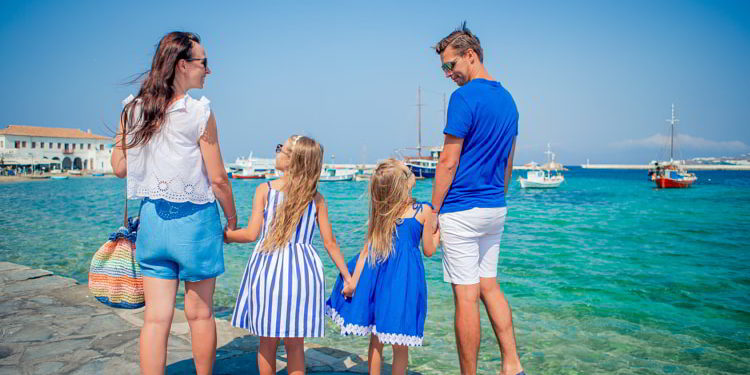Just back in Paris after two weeks traveling on the island of Cyprus with our family… including our 2-year-old granddaughter… Lief and I are reminiscing about our experiences over the past two-and-a-half decades living and traveling around the world with our kids.
Our daughter, Kaitlin, age 8 at the time, cried herself to sleep every night during our first year living in Waterford, Ireland. She was fiercely opposed to leaving her grandmother, her cousins, her friends, and her school in Baltimore behind, and she made sure we were aware of that fact every single day.
“You’ve ruined my life!” she’d sob night after night as she ran from the dinner table to her bedroom and slammed the door.
Lief and I, of course, thought we were doing precisely the opposite. We believed we were enriching Kaitlin’s life and expanding her horizons. But I have to admit, some nights I’d lie awake wondering if maybe Kaitlin weren’t right. Maybe launching a new life in a foreign country at age 8 would translate into years of psychotherapy down the road.
Our first year in Paris, it was Kaitlin’s little brother, Jackson, age 4 at the time and born in Ireland, who struggled through the transition.
“Give him six weeks,” his preschool teacher advised me every morning when I dropped him off. “At this age, he’ll adapt very quickly. In six weeks, he’ll speak French, and he’ll be fine. You’ll see.”
Meantime, every morning, as I’d turn to leave, Jackson would wrap his arms around my ankles, crying. “Please don’t make me stay here,” he’d plead. “They don’t have an English voice, and I can’t find my French voice.”
I’d pull myself free and race out the door and down the street, fighting back tears myself and wondering, again, if moving around the world with kids was really such a good idea.
Six agonizing weeks later, though, and voilà, seemingly overnight, Jackson spoke French as well as all the other 4-year-old Parisian kids in his class. He’d adjusted; he’d made friends.
In truth, our lifestyle has been easier for Jack to handle than Kaitlin. While Jack was born into it, Kaitlin might say she was yanked. On the other hand, it was Kaitlin’s idea to move from Waterford to Paris.
Kids in Ireland take what is called a “gap year” at age 15, between what would be their freshman and sophomore years of high school in the States. For this year, many study or take internships abroad. As they approached their gap year, Kaitlin’s friends began making plans to attend school in the United States, Britain, and elsewhere. Kaitlin decided she’d like to spend her gap year in Paris.
We’d been enjoying Irish country life, but by this time we were wanting for more cosmopolitan distractions. We took Kaitlin’s suggestion, therefore, as an opportunity for another family move. In the essay Kaitlin prepared as part of her admissions application for St. John’s College in Annapolis three years later, she wrote: “I fought against my family’s move to Ireland and resisted life in that country completely. But, if not for Ireland, I probably wouldn’t have gone to Paris. And now I can’t imagine not having had the chance to live in Paris.”
Today Kaitlin is grown and married and working as our Live And Invest Overseas Europe Editor. She, her husband, and their baby daughter are living in Paris… about a 15-minute walk from where I write.
Meantime, Jackson is in his senior year at NYU. He’s studied in Shanghai, Paris, and New York… and interned in Portugal, Panama, and Belize…
Today, both Kaitlin and Jackson speak English, French, and Spanish fluently… and Jackson’s Mandarin is better than passable.
All along the way I’ve worried that my children might suffer as a result of the globe-trotting lifestyle their parents chose for them. Now, with some perspective gained from the passage of time, I’m more confident than ever that the life we’ve lived these past 25 years with our 2 children has done them much more good than harm.
The advantages of raising children abroad are many, from a second (or even third) language to a second passport. Children raised overseas are generally self-confident, open-minded, and resourceful. They learn to make friends easily and adjust quickly to change. I make all these points based on now two-and-a-half decades of experience raising two children across four countries.
Start Your New Life Today, Overseas
Things To Consider Before Moving Abroad With Children
-Schools
That’s not to say raising kids in another country is easy. If you’re considering making an international move with children, they—specifically, the options for their education—become your priority. Moving to a new country with children also means that you must move full-time, or at least that you must schedule your part-time life in your chosen haven around their school calendar.
The fundamental education choice you must make is whether to send your child to a local school (where, unless you’re moving to Belize or Ireland, for example, he’ll need to learn to speak the local language fluently), to a bilingual international school (where he’ll have the opportunity to learn the new language but will take classes in his native tongue as well), or to an American or British school (where he’ll be largely insulated from the local culture and community).
Just as we’ve chosen to go local with our lifestyles overseas, we’ve also gone local with our children’s education. Why drag the kid to a new country only to enroll him in a school that could as easily be located in any U.S. suburb?
We considered this question head-on in Paris, where the American School of Paris was one of our options for Kaitlin’s education. Kaitlin and I visited together, and we both had the same reaction. The American School of Paris could be the American School of Any American Town.
Every student is from the States, as is every member of the faculty. English is the only language spoken. The curriculum, the calendar, the special events, the extracurricular activities—everything about the school is as it would be Stateside. Nothing wrong with this per se, but it seemed a shame to us for Kaitlin to miss out on the chance to learn French, to make friends from all over the world, and to become part of the Paris teenager scene.
-Health Care And Kid-Friendly Opportunities
In addition to schooling options, when you’re moving with children, you also must consider health care and local kid-friendly opportunities. Are there parks, playgrounds, private tutors, and places where the child could go to, say, study the guitar, learn to dance, take karate lessons, or join a basketball team?
-Residency Options
Likewise, you should also think about residency options. With a child, you can’t easily reside under the radar or come and go so as not to exceed the time-in-country restrictions of a tourist visa. I don’t recommend residing overseas without proper papers under any circumstances, of course, but over the years, I’ve known expats in France, Panama, Costa Rica, Thailand, and elsewhere who’ve never gotten around to legalizing their stays. Often this is not a big deal.
With school-aged children, it can be more difficult. This restriction, especially, can take a number of countries off the list of options, as it would be difficult or even impossible to organize legal residency for you and your family.
Children’s Ability To Adapt To A Move Overseas
Moving abroad with children, you might be concerned about their ability to adapt and to adjust. This has been my biggest worry. Having now moved my then 8-year-old daughter from the States to Ireland, then my then 14-year-old daughter and 4-year-old son from Ireland to France, and then, most recently, my then 8-year-old son from France to Panama, here’s what I can tell you:
Your children will be fine. The truth is, their move will be harder on you than it will be on them. They will learn the new language quicker than you will, they will make new friends more easily, and they will assimilate more readily.
Our first six months in Paris, Kaitlin would sit at the dining room table after dinner doing her homework—all in French. Before our arrival there, she’d never studied the language. Then, overnight, she was studying in the language, doing high school math in French.
The work would take her hours, after which she’d retire, exhausted and nearly in tears. Then she’d have to get up the next morning to return to school, where, again, all lectures, presentations, and course materials were in French. This shouldn’t be so hard on her, the mother in me couldn’t help but observe.
I made an appointment to meet with her adviser at school, who said this: “Kaitlin is struggling, yes. But you must let her struggle. It is good for her.”
This is the last thing a child wants to hear and the hardest thing for a parent to accept. But I tell you now, it is the right thing, the true thing. After six months of exhausting effort, Kaitlin was bilingual. She retains this asset, and already it has opened doors for her. During her first year of college back in the United States, it was her overseas experience and her second language that helped her to land a part-time job in a chic photography gallery.
Having school-aged children is not a reason not to reinvent and relaunch your life in a new country. I say: Go for it.
Don’t worry how your children will adjust. Worry how you’ll survive the adjustment period.
Sincerely,

Kathleen Peddicord
Founding Publisher, Overseas Opportunity Letter

















